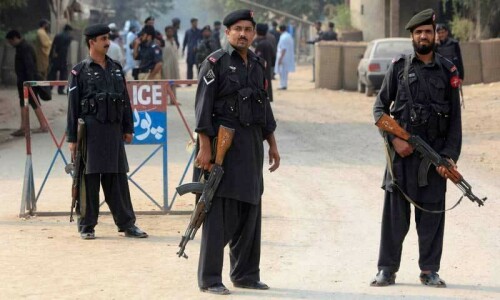PESHAWAR: A single-member Peshawar High Court bench on Friday set aside an anti-terrorism court’s order to determine the age of the suspected killer of an under-trial blasphemy accused and ordered his trial under the Juvenile Justice System Act, 2018.
Chief Justice Waqar Ahmad Seth also ordered the transfer of the suspect’s case from the ATC-III to another at his request.
The bench accepted the suspected killer’s two petitions for declaring illegal an order of ATC-III to determine his age through a medical board and transferring his case to another court.
The bench ordered the shifting of the case to ATC-II from ATC-III.
The teenage boy has allegedly killed US citizen and blasphemy accused Tahir Ahamd Naseem inside a courtroom at the Judicial Complex on July 29.
Peshawar High Court also transfers case to another ATC
The FIR of the incident was registered by the East Cantonment police station under Section 302 of Pakistan Penal Code, Section 7 of Anti-Terrorism Act and Section 15 of Arms Act.
Cleric Wasiullah and junior lawyer Tufail Zia were also arrested in the case.
The cleric had declared in his confessional statement that he had motivated the teenager to kill Tahir Ahmad Naseem, a US citizen, who was under trial on the blasphemy charge.
The lawyer is accused of taking a pistol inside the Judicial Complex before handing it over to the suspected killer.
In a revision petition, the suspected killer had requested the court to order his trial under the Juvenile Justice System Act, 2018.
Shabbir Hussain Gigyani and Enamullah Yousafzai, counsel for the petitioner, said the school documents of their client clearly showed him to be below 18 years of age and therefore, he was a child in line with the Juvenile Justice Act, 2018.
They said in the presence of the relevant documents, the ATC III had no legal powers to order the determination of his client’s age through medical examination.
The counsel said the investigation officers had asked about the age of the suspect and had mentioned it as 17 years.
They added that initially when the petitioner was produced before a court after arrest, the court had mentioned his age as 17 years on Aug 3.
The lawyers said when the case was assigned to ATC-III for trial, the presiding officer, ignoring the relevant documents and overriding the mandate of the law, ordered their client’s medical examination to determine his age on Sept 8.
They said Section 8 of the JJSA declared that the investigation officer or in-charge of a police station shall determine age of an accused on basis of his birth certificate, educational certificate or any other pertinent documents and in absence of such documents his age may be determined on basis of medical examination report by a medical officer.
An additional advocate general opposed the contention and said when there was doubt about the age of an accused, the trial court could determine his or her age through medical examination.
In the other petition, the petitioner’s counsel said their client’s father had filed an affidavit declaring that at the very initial stage during the custody proceedings, the judge of ATC-III had expressed his judicial mind about the guilt of the petitioner and even about the quantum of the sentence.
They said keeping in view the pre-judgment determination or expression about the guilt of their client and even about the quantum of the sentence, it created reasonable apprehensions in his mind about not having an impartial trial.
Meanwhile, the court will take up the bail petitions of the other two suspects, including Wasiullah and Tufail Zia, today (Saturday).
Tufail Zia was also a junior counsel representing the complainant, Malik Owais, during the trial of Tahir Ahmad Nasim in the blasphemy case. Complainant Malik Owais is a resident of Nowshera and studies in an Islamabad seminary.
Published in Dawn, September 26th, 2020














































